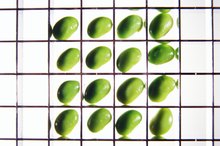High Protein Diet & Thyroid
The thyroid gland, located near the "Adam's apple" in your neck, has the vital function of controlling your body's metabolism. Diseases that impair the function of this gland can lead to depression, fatigue, weight gain, joint pain, hair loss, slowing of your metabolism and increased risk for heart disease. Diets higher in lean and balanced protein sources support thyroid function.
Effects of Low-Protein Diets
According to nutritional counsellor Dr. Ray Peat, diets low in protein or composed of an imbalance of protein sources stress the body, causing suppression of the thyroid gland. This type of diet can also reduce the body's response to thyroid hormone supplements and further lower overall metabolism. Dr. Peat reports that diets relying too heavily on either vegetable or meat sources alone for overall protein intake lack sufficient balance.
The Right Amount of Protein
Thyroid Disease & Food to Stay Away From
Learn More
In her book "The Thyroid Diet", Mary J. Shomon recommends that each of our three daily meals include one to two portions of lean protein. You can kick start your metabolism in the morning by including at least 20 g of protein with breakfast. Daily protein intake should be as much as 70-100 g.
Protein Sources
Vegetable sources alone may not provide sufficient quantities or quality of protein while diets high in meat proteins may overwhelm the body with amino acids. Dr. Peat recommends balancing protein sources, including a quart of milk per day combined with cheeses, nuts, shellfish and potatoes. Other lean protein options include fish, skinless turkey or chicken breast, and limited amounts of lean cuts of meat such as beef, lamb or pork.
Soy Protein and Thyroid
What Is Low TSH?
Learn More
Soy protein has been found to suppress thyroid function due to its' plant based estrogen content. According to Dr. Peat, estrogen inhibits the release of thyroid hormones and can lead to hypothyroidism or under-active thyroid. Large amounts of dietary soy should be avoided, particularly if you have a condition that already suppresses your thyroid function.
Heart Health Considerations
An under-active thyroid gland can increase cholesterol levels, including low density lipoproteins or bad cholesterols in your blood. Untreated, this can double your risk for heart attack. If you are increasing your daily protein intake it is important to avoid high fat sources and stick to lean proteins to avoid increasing your risk.
Related Articles
References
- Thyroid-info.com: Thyroid Disease is More Widespread Than Originally Thought
- Thyroid-info.com: Interview With Dr. Ray Peat: Thyroid Nutrition
- "The Thyroid Diet: Manage Your Metabolism for Lasting Weight Loss"; Mary J. Shomon; 2004
- "Living Well With Hypothyroidism: What Your Doctor Doesn't Tell You...That You Need to Know"; Mary J. Shomon; 2005
- "Biochemical Pharmacology"; Anti-thyroid isoflavones from soybean: isolation, characterization, and mechanisms of action; Chang HC; Doerge DR; November; 1997
- American Thyroid Association. General Information/Press Room.
- Pirahanchi Y, Jialal I. Physiology, Thyroid Stimulating Hormone (TSH). In: StatPearls [Internet]. Treasure Island (FL): StatPearls Publishing; 2019 Jan-. Updated April 25, 2019.
- AACC. Hashimoto Thyroiditis. Lab Tests Online. Updated October 18, 2019.
- DeGroot LJ. Graves’ Disease and the Manifestations of Thyrotoxicosis. [Updated 2015 Jul 11]. In: Feingold KR, Anawalt B, Boyce A, et al., editors. Endotext [Internet]. South Dartmouth (MA): MDText.com, Inc.; 2015.
- Nguyen QT, Lee EJ, Huang MG, Park YI, Khullar A, Plodkowski RA. Diagnosis and treatment of patients with thyroid cancer. Am Health Drug Benefits. 2015;8(1):30-40.
- Bindra A, Braunstein GD. Thyroiditis. Am Fam Physician. 2006;73(10):1769-76.
- Medeiros-Neto G. Multinodular Goiter. In: Feingold KR, Anawalt B, Boyce A, et al., editors. Endotext [Internet]. South Dartmouth (MA): MDText.com, Inc.; 2000-. Updated September 26, 2016.
- The National Institute of Diabetes and Digestive and Kidney Diseases. Hypothyroidism (Underactive Thyroid). Published August 2016.
- The National Institute of Diabetes and Digestive and Kidney Diseases. Hyperthyroidism (Overactive Thyroid). Published August 2016.
- Brent GA. Environmental exposures and autoimmune thyroid disease. Thyroid. 2010;20(7):755-61. doi:10.1089/thy.2010.1636
- Mcaninch EA, Bianco AC. The history and future of treatment of hypothyroidism. Ann Intern Med. 2016;164(1):50-6. doi:10.7326/M15-1799
- The National Institute of Diabetes and Digestive and Kidney Diseases. Grave’s Disease. Published September 2017.
- Stagnaro-Green, A., Abalovich, M, Alexander, E. et. al. Guidelines of the American thyroid association for the diagnosis and management of thyroid disease during pregnancy and postpartum. Thyroid. 2011(21)10. doi:10.1089/thy.2011.0087
- Liu G, Liang L, Bray GA, et al. Thyroid hormones and changes in body weight and metabolic parameters in response to weight loss diets: the POUNDS LOST trial. Int J Obes (Lond). 2017;41(6):878-886. doi:10.1038/ijo.2017.28
- Bahn R, Burch H, Cooper D, et al. Hyperthyroidism and other causes of thyrotoxicosis: Management guidelines of the American Thyroid Association and American Association of Clinical Endocrinologists. Endocrine Practice. 2011;17(3). doi:10.1089/thy.2010.0417
- Braverman L, Cooper D. Werner & Ingbar's The Thyroid, 10th Edition. WLL/Wolters Kluwer; 2012.
- Garber J, Cobin R, Gharib H, et. al. Clinical practice guidelines for hypothyroidism in adults: Cosponsored by the American Association of Clinical Endocrinologists and the American Thyroid Association. Endocrine Practice. 2012;18(6). doi:10.1089/thy.2012.0205
- Haugen A, Alexander K., Bible K, et. al. 2015 American Thyroid Association Management guidelines for adult patients with thyroid nodules and differentiated thyroid cancer. Thyroid. 2016;26(1):1-133. doi:10.1089/thy.2015.0020
- Smallridge R, Ain K, Asa S, et. al. American Thyroid Association guidelines for management of patients with anaplastic thyroid cancer. Thyroid. 2012;22(11). doi:10.1089/thy.2012.0302
- Wells, S, Asa S, Dralle H, et. al. Revised American Thyroid Association guidelines for the management of medullary thyroid carcinoma. Thyroid. 2015;25(6). doi:10.1089/thy.2014.0335
Resources
Writer Bio
Calling the Rocky Mountains home, Julie Warren has been writing since 2009. She has published in "American Beauty" magazine and has lectured and presented specialty areas of sports medicine. Warren holds a Bachelor of Science in physical therapy and a Bachelor of Science in physical and health education from McMaster University in Ontario, Canada.







